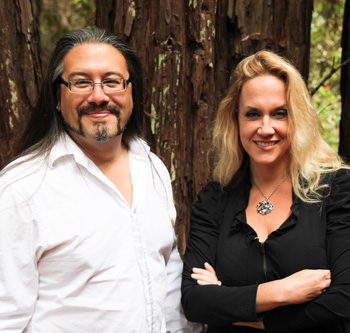Campus News
UCSC hires game industry veterans to run professional degree program
Award-winning game designers Brenda Romero and John Romero will direct the new master’s degree program in games and playable media.

The Baskin School of Engineering at UC Santa Cruz has hired Brenda Romero and John Romero, both award-winning game designers with decades of experience in the computer game industry, to lead the new master’s degree program in games and playable media offered at UCSC’s Silicon Valley Center.
Program director Brenda Romero (formerly Brenda Brathwaite) came to UC Santa Cruz in January 2013 as the first game designer in residence at the Center for Games and Playable Media, where she has been teaching and advising students. A game designer, artist, writer, and creative director who entered the video game industry in 1981 at the age of 15, she received the 2013 Women in Games Lifetime Achievement Award from Microsoft for her contributions to the game industry.
John Romero is well-known as a programmer, game designer, and artist whose development work spans more than 100 commercially published games and includes iconic games such as Wolfenstein 3D, DOOM, and Quake. He has cofounded eight successful game companies, including id Software, Gazillion Entertainment, and Loot Drop, and remains active in the game industry. As creative director of the Games and Playable Media master’s program at UCSC, he will teach courses, mentor students, and help shape the overall creative vision for the program.
“We are very excited to have two highly accomplished veterans of the game industry coming on board to direct our new professional degree program,” said Jim Whitehead, professor and chair of the Computer Science Department. “They have been involved in the development of a huge number of games and game studios, and they have created some of the most influential games, both in mainstream culture and in the art world.”
Both John and Brenda Romero also have experience leading well-regarded game programs at other universities. Brenda Romero served as chair of the Savannah College of Art and Design’s Interactive Design and Game Development department, while John Romero helped establish the Digital Games Guildhall program at Southern Methodist University.
As program director at UCSC, Brenda Romero oversees the curriculum and instructors, teaches and mentors students, and builds connections with companies in the computer game industry. The program’s advisory board features leading game developers, including Will Wright (Stupid Fun Club), Harvey Smith (Arkane), Derek Yu (Spelunky), Robin Hunicke (Funomena), Ben Prunty (FTL), and Brian Schwab (Blizzard).
“Industry connections are very important for this program, so that students can interact with people in the game industry through visiting speakers, master classes, internships, and other opportunities,” she said. “The individuals on our advisory board represent a diverse cross-section of the game industry, from the hard-core AAA space to those defining the indie space.”
The M.S. in games and playable media is a yearlong (12-month) degree focused on combining technical and design innovation. The program includes a project-oriented, yearlong course sequence in which students work in teams to create innovative games, critiqued and mentored by the creative director.
John Romero’s role as creative director will be to push students beyond what they already know to create novel possibilities for playable experiences. “In creating games, I look for innovative ways to explore spaces and game mechanics, doing things other games have not done,” Romero said. “In working with UCSC, my goal is to push students toward innovation while working on my own new indie projects alongside them.”
The computer games industry has been growing rapidly. In 2010, U.S. consumers bought $25 billion worth of computer games and equipment, up from $8 billion in 2000. UCSC launched its highly successful undergraduate degree in computer game design in 2006. According to Whitehead, demand for graduates from that program has been high, even in a depressed economy, with average starting salaries around $80,000. The new M.S. degree program addresses a similar need at the graduate level, he said.
Brenda Romero noted that it will be important for the program’s curriculum to adapt as the game industry changes over time. “I’ll be looking ahead at what’s going to be happening in the industry two years down the road, so we can prepare students for that,” she said.
Brenda Romero has worked with a variety of digital game companies as a game designer or creative director, including Atari, Sir-tech Software, Electronic Arts and numerous companies in the social and mobile space. In recent years, she has become known for an award-winning series of non-digital games titled “The Mechanic is the Message.” She has served on the board of the International Game Developers Association (IGDA) and chaired the IGDA’s Women in Games Special Interest group, and currently serves on the advisory board of the International Center for the History of Electronic Games at the Strong Museum of Play. She was named one of Forbes magazine’s “12 Women in Gaming to Watch” in 2013.
John Romero is considered to be among the world’s top game designers and programmers, and his products have won every major award. One of the earliest independent developers, he began working in the game space in 1979 on mainframes before moving to the Apple II in 1981. He is a completely self-taught programmer, designer, and artist, having worked on dozens of independent games before co-founding id Software. Romero’s current areas of interest are massively social games, the indie game scene, and social media’s intersection with gaming. Romero has been chairman of the CyberAthlete Professional League, an advisory board member of several game companies, and is a member of the British Academy of Film and Television Arts (BAFTA).